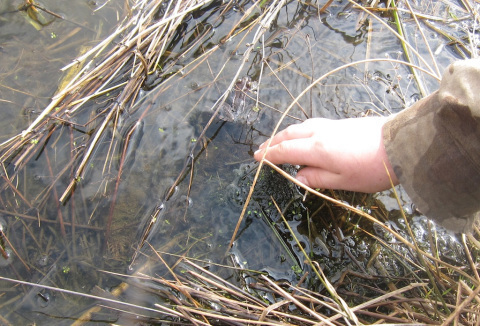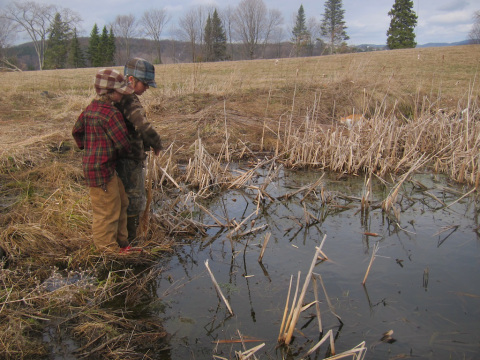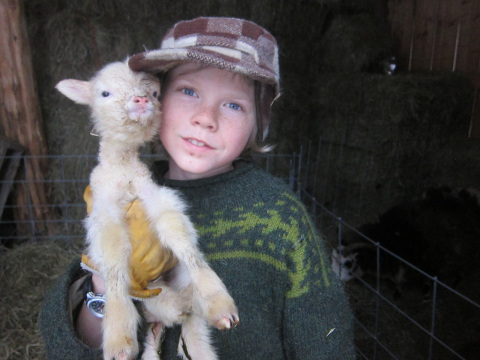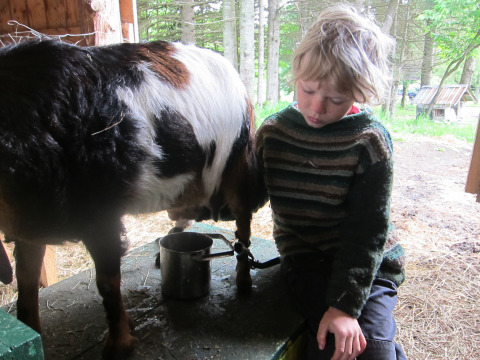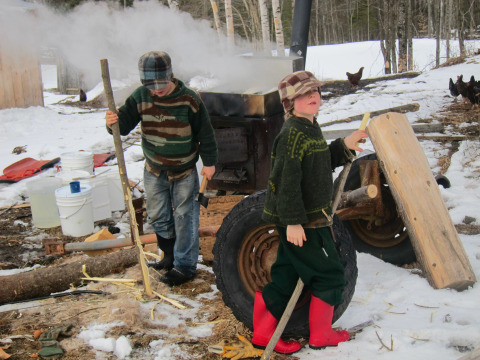Ben Hewitt's Blog, page 70
April 22, 2013
I’ll Take Naive
On Friday, I drove 8 hours in a southwesterly direction, on my way to a talk in PA. Of course, this was the day of out-sized drama in Boston, and while I would like to claim that I was not captivated by the unfolding narrative, that would be a lie. So I plowed down I95 in our old Subaru, alternating between NPR’s ceaseless coverage of the lockdown and whatever classic rock station offered the best reception and the fewest Peter Frampton ballads. Not that there’s anything wrong with Frampton, of course. But a guy can take only so much.
I don’t leave northern Vermont terribly often, and every time I do, I’m struck by just how far I’ve drifted from the mainstream American experience. Or, at least, the mainstream American experience as exemplified by Interstate travel through ceaseless sprawling miles of industry and commerce. A few random observations: How the hell do folks afford the vehicles they drive? Everywhere I went, the cars shiny and new, 30 and 40 thousand-dollar contraptions coming up fast to fill my rear view mirror with the menacing grilles and muscular sheet metal that have become the status quo over the past decade. Not every single one, of course, but the sheer volume of large and loutish automobiles seemed to increase in disproportion to the sort of conditions in which one might actually use one of these vehicles to its advertised potential.
Along the Jersey Turnpike, at one of those dispiriting Interstate Service Centers (Gas! Diesel! Cinnibon!) I stopped for a coffee and a pee break, tucking our mud-splattered Subie between the gleaming flanks of twin SUVs. Yukons, I think they were, or perhaps Envoys. For a moment, I fretted over the fact that our door locking mechanism has long since given up the ghost, and then cast my glance around the car: What, really, could I not do without? The rusty pair of vice grips on the passenger floor? The half-quart of motor oil? Anyone who might brave the mud and manure-stained innards of our rig to lift these items would surely need them at least as much – if not more – than I. Feeling thus liberated, I was even so bold as to leave the keys hanging from the ignition before slipping into the surreal, narcoticizing world of Turnpike commerce.
There was something about the confluence of factors during my drive that made me realize just how naive I am. Along the Turnpike, I flew past the Linden Cogeneration Plant, dozens of acres or more of belching smokestack and outlandishly complicated and tubular infrastructure, a sci-fi novel come to life. Across the interstate (how many lanes in total? Six? Eight?) from the plant, a shipping port, with row upon row of cranes and stackable steel cargo trailers, a display of ingenuity, industry, and the rigid lines of manufactured exactitude to rival anything I’ve seen in a good long time. And the whole while, one terrorism expert after another droning through the radio, as the good people of Boston and the surrounding communities sheltered in place. Shelter in place. It has an almost cozy ring to it.
I often wonder how my world view might shift if only for a single factor. For instance, what if that were my daily commute? Not the endless soundtrack to the tragic goings on in Boston, of course, but everything else: The fancy, flashing, angry cars, the over lit, hollow prosperity of interstate service centers, the gleaming, fantastical infrastructure of power generation and intercontinental commerce. These things are novelties to me, so strange as to appear almost otherworldly, but of course to millions of my fellow countrymen and women, they offer the quotidian sights, sounds, and smells of daily life. Of course, I cannot say with certainty how such experiences might influence my emotional state, but it’s hard to imagine that my emotions and perceptions would not begin to embody the cold, human-over-nature ambience of the surrounding landscape.
So, yes, I see now that perhaps I am naive to think that we, as a species, might overcome the tragic force of our own ingenuity and ambition, when so many of us are immersed in lives offer little else but evidence of these things. I see that, and I think to myself, ah, but what is the alternative to my naiveté? Hopelessness? Acquiescence? Cynicism?
And then I think, you know what? I’ll take naive.

April 18, 2013
Doesn’t Mean We Have To
Triplets!
The past few days have been swirling wind of activity: Two pigs dispatched, copious amounts of sausage made, innumerable trees and other plant species stuck into the just-thawed soil, friends visited and visiting, two piglets procured, and a small land clearing project commenced. We are in the season of seemingly inexhaustible energy, and since we know it can last only so long we intend to milk it for all it is worth. There is perhaps nothing better than that feeling, of waking up to excitement over the day’s list of tasks, of drifting off each night with a half-peck of dirt under the fingernails and your neck itchy with sunburn.
It is my great fortune to pass the majority of my days in the company of my family. Every morning we do chores together, and eat breakfast together. Every noon we gather for lunch. In the late afternoon, chores again and then dinner. On most days, there is at least one farm or home-related project that involves the four of us. It would be a gross exaggeration to suggest that we always operate as a cohesive team, because of course we suffer no shortage of uncooperative and downright obstinate behavior (and that’s just on my part).
Don’t get me wrong: There are days when we move through the world in four separate orbits, tending to our various individual tasks and responsibilities, and coming together only briefly, for a quick meal or to confer on something or another. Likewise, there are times when I want nothing more than a little peace and quiet, to be left the hell alone to do my thing, free of the clamor and commotion inherent to young boys. Or our young boys, at least. But the truth is, these days are the exception, rather than the norm.
I am often struck by the extent to which twenty-first century American life fragments families. Oh, sure, there is plentiful rhetoric about “family values” (which seems to have become some sort of code for a particular set of values relating to a particular religion), and valuing our children, and so on. But like so many of the things America claims to be and to stand for, these things have been reduced to platitudes, because of course the truth is most families simply can’t survive in modern America without fragmenting themselves. Both parents up early and off to work, the children up early and off to school so they can learn how to navigate the world as the miniature adults they are expected to be, and then after school extracurricular activities to ensure they don’t have a moment of time to just be. Or worse yet, the screen as babysitter and entertainer, with the average school aged child now spending a full 53 hours each week gazing into a pixelated faux reality that bludgeons and overwhelms their senses to the extent that the real reality of the natural world beyond the screen no longer has the ability to captivate. Its wonder and beauty lost to the manufactured hyper surrealism of fantasy.
In his book Dumbing Us Down (which you should read, if you haven’t), John Taylor Gatto writes “Two institutions at present control our children’s lives: television and schooling, in that order. Both of these reduce the real world of wisdom, fortitude, temperance, and justice to a never-ending, nonstop abstraction. In centuries past, the time of childhood and adolescence would have been occupied in real work, real charity, real adventures, and the realistic search for mentors who might teach you what you really wanted to learn.” Gatto wrote these words at least a quarter century ago, and the control he speaks of has only become more pervasive since.
I know that we are incredibly privileged to be able to make the choices we do regarding how we educate our boys and how much time we are able to spend together as a family. On the other hand, I see the choices other families make – mostly regarding money and debt and simply believing the prevailing cultural narrative of our time, which is that it is perfectly normal for families to exist primarily in separation from one another, rarely working toward a common goal, or toward the completion of a project that demands collaboration and cooperative problem solving and simple empathy for one another.
Sometimes I think there is an assumption that the way things are – and here I’m speaking of this dominant cultural narrative that tells us so much about what we should want and do – is the way things should be. Sometimes I think we don’t stop to consider that just because something has been, doesn’t mean it should be. It doesn’t mean we have to.

April 12, 2013
On Track
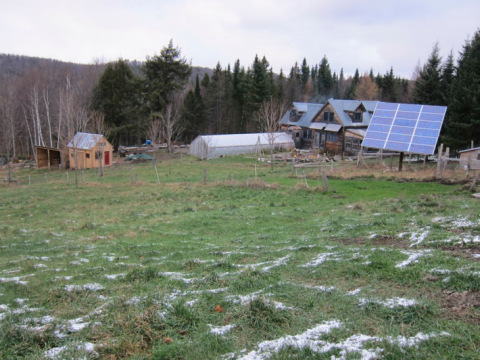
From the height of our land, looking north. Infrastructure not pictured: Primary critter and hay pole barn, wind turbine, tool shed, and two greenhouses
This is our place. Or most of it, anyway. Despite what I wrote a couple of weeks back, I actually kind of like it. It is simple and somewhat rustic, and at times entirely chaotic and messy. But we know every nook and cranny (have assembled most of those nooks and crannies ourselves), and I have wonderfully specific memories from certain events during construction: The time I fell down the open stairwell, the work party to hoist 7″x9″x20-foot green hemlock beams in place, the day a concrete truck got so stuck we had to bring in two 100+ horsepower tractors to extricate it. It took hours and no one would charge us a nickel for their time and equipment. I can point to the exact spot in the living room where each boy was born, and where they took their first steps.
As I mentioned in that previous post, there are things we would do different, if we had the chance to do them again. But when I consider everything this place holds for me, in ways physical, emotional, and even spiritual, and when I look at the photo above and realize that each and every one of the structures on our land are imbued with specific memories, most often involving Penny and the boys and/or good friends… well, I suppose in that regard, I wouldn’t change a darn thing.
My plan is to grow old and die here, and although none of us can really know how our lives will unfold, I am pleased to report that so far, I’m right on track to meet this goal.

April 11, 2013
Lesson
I wrote this a few years ago, about our neighbor, Melvin. Last December I was signed up to do a local reading and for a variety of reasons (mostly because I am a shiftless sloth of a writer), couldn’t come up with anything new. So I dusted off my Melvin story and refreshed the ending. The changes are small, and some people probably wouldn’t even notice them. But I like the new ended much better, and it’s a lesson to me in how minor edits can make a big difference to a piece of writing. Remarkably, that has escaped me until recently.
I wonder what we really lose when we lose our farms. What we’ve lost already. The talk seems to be one of money, of how the monetary value of these farms is greater than the value of their product for all the economic activity they generate. Tourists, milk truck drivers, tractor salesmen, auctioneers; all are tangential benefactors of the agricultural landscape. Vermont has even determined how much all these parts are worth: $14,000 per cow.
I don’t dispute these numbers. But to me, they ignore a deeper, intrinsic value that can’t be measured in dollars alone. Maybe it can’t even be measured at all; maybe it can only be absorbed, as if by osmosis. I absorb a little every September, when Melvin pastures his milkers in the hayfield abutting our land, and my boys, eager to prove they are growing into the young men they will become, herd them down to the barn for afternoon chores. And I absorb a little every time I pass one of the numerous farms in my hometown – the Ackermann’s, the Stecker’s, the Bothfeld’s, the Paquin’s – my eyes drawn to the cows, some bent to the grass, some loafing in the shade of a fence line maple, quiet, sentient reminders that while humanity’s connection to the land may have suffered under the delusion of our arrogance, it has not yet been severed.
There is a feeling of inevitability surrounding the future of Vermont’s dairy industry. Many of the loans that carried some farmers through the past two seasons have gone unpaid, and more credit will be hard to come by. The state’s Agency of Agriculture has predicted that as many as 200 more farms could go under by year’s end. Even if it’s half that number, it’s shaping up to be a tough year.
Melvin Churchill, buffered from the worst of the downturn by his organic status and the fact that his farm is paid off, acknowledges this reality. “Realistically, it won’t be a farm forever,” he told me, when I asked him about the future of his place. At some point, most likely by force of age or simple weariness, Melvin will move on. At some point, my boys won’t herd his cows anymore, either because my boys no longer want to, or because there are no cows to herd.
There are times when I consider the implications of this and wonder if sometime soon, the barns and pastures of my hometown will be not unlike the Petroglyphs Melvin saw in Arizona. Artifacts. History. The remains of a particular way of life and the people who lived it.
Maybe so. Probably so. But for now, I take some comfort in the fact that I can walk over the hill, across the Melvin’s pasture, amongst his big, gentle cows. For this summer, at least, my boys will spend hours at the edge of the hayfield above our house, watching Melvin mow and rake and bale. This year, and likely for a few more, I will drive the back roads of Cabot, past the town’s remaining farms. I will see people I know doing work they love for wages they cannot or can barely afford, and I will be reminded again that the value of a particular task is not always best measured by the money it will bring. When I get home, I will try to explain this to my boys.
And I will hope, more than anything, they will understand.

April 8, 2013
That Simple
Both mornings this weekend I was down the field gathering sap well before breakfast was on the table. The snow has disappeared from all but the north facing hollows, so I took the garden cart down Melvin’s field, with a quartet of empty five-gallon buckets rattling about in its hold. In a cruel twist of fate, the majority of the premium maples in regards to girth, health, and the sugar content of their sap reside at a lower elevation than the house, which means of course that I descend with empty buckets and ascend with full ones.
Four full buckets – 20 gallons of sap – is at the outer limit of what I can do, and if one were to happen upon me at the steepest pitch along my journey home, I could forgive whatever humor they might find in the scene. I know how absurd I must look leaning into the hill and dragging that damnable cart behind me with all my might (which is none too much), progress measured one measly half-step at a time, and each one requiring a desperate sort of forward lunging motion, lest the loaded cart gain the upper hand and drag me backwards, my hard fought progress disappearing before my eyes. I cannot confirm or deny that this has ever happened.
Sunday morning’s gather was particularly memorable, if only because the night before Fin and I had stayed out until the wee hours, taking in a Waylon Speed concert at a local (or what passes for local, being only 30 min away) pizza joint/watering hole. Yes, it is true: I am the sort of father who allows his 11-year-old son to accompany him to raucous rock n’ roll shows at venues where drunken adults can be seen making asses of themselves. But Fin and I share a weakness for hard rock (and particularly for WS, which is one of those gem of a bands that should be way more famous than they are), and the boy is guitar player and, well… you can see how such an adventure would be, er, educational, right? I did point out to Fin that he was the only child in attendance, the subtext of which was suggest what a completely awesome father I am, and therefore deserving of his utmost gratitude and affection. He didn’t seem to pick up on it.
So yeah, on Sunday I was moving a little slow at first. But the first trip got my blood flowing and by the second trip sweat had risen on my brow, and by the time I’d gathered from the little sugarbush above our pond it was nearly 7 and I’d almost forgotten the paucity of sleep. I felt invigorated and tough, if not unconquerable (rock n’ roll all night and work my ass off every day and all that), and I spent the rest of the day ripping into a variety of rural pursuits, a sort of small farm Olympics: I boiled sap, bucked and split firewood, worked on the tractor, and made myself a list of lumber for the next time I get the sawmill fired up. I did chores morning and evening, bottle fed the orphan lamb, and cleaned up a bunch of brush from one of last autumn’s chainsaw adventures. I made lunch and mixed up a batch of sourdough bread to sit overnight. I took a run to the freezer at Melvin’s and extracted four quarts of cream, a quart of lard, two T-bone steaks, two pounds of fennel sausage, a pound of bacon, and something else I can’t remember, but which was probably comprised of either the milk or meat of one of our animals. Or blueberries. It might have been blueberries. I went to Jimmy and Sara’s and picked up colostrum for the pigs.
Overall, it was an enormously productive day, fueled at least in part by memories of the evening before, me and my boy sharing a fruit spritzer and watching drunks dance to one of our favorite bands four hours past his bedtime.
Good music, time with my son, and hard work: It is possible that life is sometimes no more or less complicated than that? Yeah, I think it is.

April 3, 2013
Confounding
This morning I was up and out early, and it was as fine a beginning to a mid-January day as I’ve ever seen in April. The temperature hovered around 20, the wind gusted from an indeterminate direction that seemed to be every direction at once, and the half foot of snow that visited the day before had been freshened by another yet another inch or two. Above, the remnants of a perfect half moon, ringed by a haphazard collection of clouds radiating that particular pink-orange color of the rising sun. They were the most graceful clouds I’ve seen in a while, and I’ve seen my share.
For a moment, I considered being pissed about the weather. I mean, really, what wasn’t there to hate? Cold, wind, snow, the animals’ water bowls iced over and necessitating intervention, more firewood to be brought in and fed into the insatiable maw of the wood stove, the boys beset by some virus and moaning plaintively from the couch for one damn thing or another. And all this after last weekend’s halcyon glory, with its high, beating sun, the freckles emerging on our faces after a winter of remission, the mud sucking at every one of the thousands of steps we took to and from our little backyard sugarin’ rig. Ah. A long-held breath exhaled.
So, yeah, I admit I tried to be upset, if only because it felt like the proper response to the situation at hand. But the truth is, I just didn’t have the heart for it. I’m not sure exactly how to say it, but somehow it just felt easier to enjoy my rounds: First the cows and sheep, then to the solar panels to sweep them clear of snow, then the chickens, and finally the pigs, so thoroughly untroubled and snuggled into their little white-trash-truck-cap housing they didn’t even rouse at the slosh of milk being poured into their trough.
As I walked my rounds, I thought about a conversation I’d had the evening before, with a journalist interviewing me in regards to SAVED. And I thought of how I’d struggled to explain how it could be that the primary character in the book, who lives on $6,000 per year, was one of the wealthiest people I’ve ever met. It was almost as if the common language the journalist and I spoke didn’t contain the words necessary to properly express myself. Or perhaps it’s not the words that are lacking, but our collective associations to those words.
And then I thought about how I often hear from people that they would like to have a little farm of their own, would love to do at least some of what we do here but, if they’re to be entirely candid, it seems sort of, well, difficult. Sweaty. Dirty. Thirsty. Sore. Hungry. Cold. Hot. Your life defined by chores and toil, no packing the car and heading to the shore for the weekend, no jumping on a jet plane and flying south come winter. And I thought about how again I always find myself grasping for the right words to explain that yes, they are right. It is all true. But it’s all false, too.
Our friend Erik isn’t poor; he’s rich. And even more confounding, Erik is rich at least in part because he’s poor, because he’s consciously chosen a path that compels him to cultivate relationships with the people and the world around him. He has to: That’s what it takes to survive on $6k per year.
Our life isn’t hard; it’s easy. And even more confounding, our life is easy because it’s hard, because all the things that seem like hard work are actually the things that, for us, making getting up early to greet each day a meaningful experience. And I’ll be darned if waking up to that feeling isn’t the easiest thing in the whole, wide world.

April 2, 2013
Burden
Yesterday I caught wind of a recent NY Times article about the recent surge in diagnosis and treatment of ADHD in America’s school age children. According to the article, there as been a 53% rise in cases of ADHD in the 4 – 17-year-old age group over just the past decade.
Now, it just so happens that for another project, I’d recently done a little research into the market for ADHD drugs, most of which are prescribed to children. It probably won’t surprise you to hear that psychotropic behavioral modification drugs are a consistent profit-maker for the pharmaceutical industry, adding up to $7.42 billion in 2010, an 83% increase in just four years. And in 2011 alone, Novartis reported a 19% increase in sales of Ritalin. It’s probably worth noting that these drug carry the potential for the following side effects: Difficulty breathing, double vision, depression, paranoid delusions, and severe aggression. Because they alter the neural pathways in the brain, they are also habit-forming.
I am certain that if my children were “tested,” at least one of them would receive a diagnosis of ADHD (I’m also pretty certain that if I were tested, I’d be diagnosed as such), and there is no question that maintaining focus and managing a seemingly bottomless well of exuberance are two of our biggest challenges around here. But here’s the thing: Because of how we’ve structured our lives, we can meet these challenges, albeit not always with the utmost grace. Furthermore, because we are able to meet these challenges, we are able to view these qualities as being not necessarily undesirable, but actually beneficial. I love my children’s boisterous exuberance and their unrelenting passion, even as it flits from one project to another and I view it as one the greatest privileges in my life that I am able to accommodate it and be present to watch it unfold on a hour-by-hour, day-by-day basis. Frankly, it saddens me to consider how few parents are able to have this opportunity in 21st century America.
Furthermore, what good can possibly come of labeling a child’s natural behavior as a “disorder” that must be corrected? Damn straight our boys are fountains of often-frantic energy and near-constant excitement. I can see how these qualities might not work so well to an institutionalized learning environment, and I am again grateful that we do not have to demand that anyone in our family modify their behavior via the ingestion of habit-forming pharmaceutical drugs, just so they can conform to the behavioral expectations set by the contemporary educational and medical systems. The truth is, I do not want these systems to tell me who my children are. I want my children to tell me who my children are.
To finish, I have two questions: Is the increase in sales of ADHD drugs the result of an increase in diagnoses? Or is it possible that it’s actually the other way around?
And: What message does it send to our children (nearly 7 million of them, according to the article) first that their behavior must be modified, and second that the best way to modify it is to alter their brain chemistry with drugs?
I don’t know about you, but I’m thinkin’ that’s a pretty heavy burden for them to shoulder.

March 29, 2013
Ticking Away
Awhile back, Doug W left this comment on the SAVED page. I’d meant to turn off comments for that page, which, after taking his down, I did. But he raises such fantastic questions, ones that permeate almost every aspect of my life (and, I’m guessing, at least a few of yours’), that I feel compelled to devote an entire post to his comment.
The unspoken other topic here and in all the recent posts about money is the matter of time. The two have been linked ie either you have the time or the money in a given situation. But what about time in and of itself? How do we experience it? Is really scarce. Is it linear or really cyclical? Is it possible to live in the eternal present in the modern world? One of the most common experiences around a homestead is to become lost in a specific task, to be totally present, and immersed, activities like fencing or cutting wood without any sense of the passing of time.
I’m not even sure where to begin with this subject, because it’s just so huge and important. As seems to be my wont, I suppose I’ll start with a personal anecdote.
It was 1998 when we first moved onto our property and began immersing ourselves in the many land-based tasks that now comprise the majority of our waking hours. I remember feeling lots of things during this period, but most pertinent to the issues of time and money is that I recall being amazed that anyone (and in this case, by “anyone,” I mean Penny) would so willingly work so damn hard to raise, say, a crop of tomatoes that could be purchased at a grocery store for a price that, if applied to the literal fruits of her labor, meant she was pulling down a coupla bucks an hour. At best. (It is probably worth noting that at this point in my life, I was far more interested in riding my bike and skiing than sticking a shovel in the ground, which seemed to me like a whole lot of bother).
I suppose what I’m saying is that I was still a believer in the adage that “time is money”; as such, I could not imagine exchanging my time for a measure of recompense that, when measured strictly in dollars, could not compete with the commodity market.
It is amazing to me now to consider how many lies and misconceptions reside in that one sentence. For instance, the notion that time is money. There are innumerable ways to dispel this idea, but I suspect the most poignant would be to ask someone with a terminal illness how they feel about it. If you think their thoughts on the subject don’t apply to you, bullshit. All our lives are finite. Some are just more finite than others. I’ve said it before, but I think it bears repeating: Our societal belief that time and money should be conflated is extraordinarily convenient for a commodity market capable of producing (usually crappy) products at a price that makes it compelling to consume, rather than produce.
There is another flaw to this line of reasoning, and it is this: That the labor we invest in producing for ourselves does not have its own value. In other words, that we should consider it a burden, rather than a blessing. The truth is (and this is not unusual), Penny was way ahead of me with those tomatoes. She understood that the hours spent amending and seeding and watering and picking and processing should not be detracted from the final tally, but added to it. In her view, it was a blessing to have the privilege of entering into that relationship with those tomatoes and this relationship had a value that could not be expressed in monetary terms.
The older I get and the more of these relationships I enter into myself, the more I find myself able to, as Doug W suggests, fully inhabit the moments of my life in a manner that entirely alters my relationship to time itself. It’s not that it slows down or speeds up; it’s just that it feels like it’s mine. There’s actually a term for this: Temporal autonomy, which can roughly be defined as the capacity to spend your time in the manner that is most satisfying to you.
If there is any single motivation for how we live our lives, that’s it right there. We want to spend our time (which is to say, our lives) in the manner that’s most satisfying to us. It just so happens that what satisfies us is to be on the land, to have relationships with our animals and our trees and our kids and the ground beneath our feet. Almost every decision we make around issues of money – should I write this article or not? Should I take this speaking gig or not? – are made only after we’ve determined whether or not it will enable us to deepen these relationships. Of course, that’s a over-simplistic way to put it, but it’ll work for now.
Befitting such a long post, I will leave you with a relatively long excerpt from SAVED. And that’s it for today. Because, you know, I’ve gotta get back to work and make some dough.
…the inescapable and somewhat unsettling conclusion remained: Erik’s relationship to time was different from mine, and I say “unsettling” because I was fairly certain his relationship was less dysfunctional. I’d first noticed this more than 6 months before, during that November day I stopped by his house to find him contentedly cutting boards with a dull handsaw. During our mushroom hunt, I’d twice noted it, first when our search continued past the span of time that seemed (to me, at least) reasonable and again in response to my query about the hike from the cabin. There was something in the unhurried nature of Erik’s day-to-day existence that made it feel as if he owned his time to an extent that most of us have forsaken.
In his book Discretionary Time: A New Measure of Freedom, Robert Goodin points out that time is both inherently egalitarian (everyone has access to the exact same 24 hours per day) and inherently scarce (no one has access to more than 24 hours per day). Goodin talks about “temporal autonomy,” which is the ability to make choices regarding how one’s time is passed. Given the egalitarian nature of time, not to mention its scarcity, the capacity to choose how we spend our time could be viewed as the ultimate expression of wealth, and it struck me that Erik’s unhurried, almost languid temperament suggested a particular confidence that could only evolve from an abundance of temporal autonomy. Or, put more simply, from the certainty that he could damn well do what he pleased, when he pleased.
For a moment I probed my memory, but I could not recall a single instance when I’d heard Erik worry or even wonder about the time. And I thought how interesting it was that watches have become such a symbol of status in our culture that people are willing to spend thousands or even tens of thousands of dollars on a little clock to ride on their wrist. Perhaps it was merely the jeweled aspect, the diamond-studded bezels and gold-striped bands, but I couldn’t help wondering if it was also something in the auspicious display of the timekeeping mechanism itself, as if reminding the world that the bearer’s time is so very valuable as to demand such royal carriage. And then an irony struck me: If one’s time is so damn valuable, why in the name of Rolex would anyone allow a clock to rule it? Viewed in this light, being beholden to a clock could be seen not as you owning your time, but as your time owning you.
It occurred to me that unlike most of us, Erik does not compartmentalize his time; he does not seem to differentiate between the hours spent in pursuit of a paycheck and the hours spent in pursuit of either mushrooms, a finished cabin, or a pair of dumpster’d sneakers. He seemed to understand more clearly than anyone I’d met that there is only one thing human beings truly own, one thing that cannot be claimed by others: time. Furthermore, he seemed to respect the rather uncomfortable truth that none of us can rightly claim to know how much we own. As such, he seemed determined not to convert his unknown quantity of time—in truth, his life, for how we spend our hours and days is, of course, how we spend our lives—into a commodity, to be sold to the highest bidder.
At first, I struggled to square this with the languor he applied to so many of his tasks. For who would spend hours cutting boards with a rusty handsaw but someone who felt as if time were very much on their side? If Erik were really so cognizant of the true value attached to the ticking clock of his life, would it not behoove him to at least get a freakin’ Skil saw? But the more I observed him in action, the more convinced I became that I had it exactly backward. Indeed, it occurred to me that Erik had an absolute respect for time, to the point that he was able to exist inside any particular moment with tangible contentment. He understood that the value wasn’t to be extracted by rushing to get to the next project, but rather by truly inhabiting each and every moment he was fortunate enough to experience.

March 28, 2013
Multitasking
As many of my longtime readers know, I occasionally fall victim to the manufactured educational expectations of contemporary America and begin to have doubts about our ability to educate the boys at home.
Yesterday, watching them make bows while tending our little white trash backyard sugarin’ rig as the chickens pecked at whatever struck their bird-brained fancy, was not one of those occasions.
Increasingly, I am coming to understand that any doubt in our ability to educate Fin and Rye is nothing more than a loss of trust. Not only in myself, but also in the boys.
I can deal with not trusting myself. But not trusting my kids? That, my friends, is inexcusable.

March 27, 2013
On Fire
Yesterday I hardly even thought to check to see if the sap was running. After all, it wasn’t all that warm, and there was a steady breeze out of the north, a combination that doesn’t typically bode well for a good sap run. But by 2:30, I’d had about enough of listening to myself (this is one of the strange things about writing; it’s sort of like listening to yourself talk all friggin’ day. And even I can take only so much of that), and I needed a diversion. A quiet stroll down to the maples at the far reaches of Melvin’s hayfield seemed like just the ticket.
By gum, those buckets were nearly full. In fact, a few were overflowing, and the sap was running so hard that steady rivulets of sweet water rolled down the bucket sides to drip deep melt holes into the snow below. I humped it back to the house, grabbed the sled and a trio of 5-gallon buckets, and took off back down the field at a trot. It took three trips to complete the gather, and by the end I was down to a tee shirt and feeling that wonderful skin-tightening sensation of the high sun on my winter-white arms and face. Damn but I love that feeling.
Hell, I’ll just say it: I’m fired up. And if I’m fired up, you can only imagine how Penny’s feeling. That woman is a freakin’ inferno this time of year (well, most times of year, to be honest), plotting and planning and gumming up the whole damn kitchen with flats full of soil blocks and the implements of her trade. In fact, right now, in addition to Puck, an orphan lamb with a hurt foot who follows us around in her pathetically plaintive way, our kitchen is home to a split-open 55-gallon barrel full of potting soil, myriad bags of amendments and other potions, and enough seeds to grow enough food to feed an army. Or our boys, whichever eats more (my money’s on Fin and Rye). Not only that, but she’s got a list of tasks so long that I get dizzy just looking at it. “Don’t worry,” she told me this morning, “most of them are quick.” I looked at the list and saw, among other things, “build rocket mass heater,” “build outdoor bread oven,” “build new chicken coop,” “finish sawmill roof,” “finish firewood,” and “plant terrace orchard.” Well. Thank goodness they’re all quick. What will we do with all our free time this summer?
Truth is, not all of these things will happen, or at least, not all of these things will be completed over the next six months, and probably not over the next 12 months, either. We know this, and we know it well, having now passed better than 15 years on this little patch of dirt and grass and trees (oh, and rocks… can’t forget those). But we also know well that there’s a season for everything, and this is the season for indefatigable enthusiasm, even if said enthusiasm goads us into creating an entirely unconquerable list of tasks.
The other truth is, if there ever comes a spring when we don’t feel this enthusiasm, don’t feel the small fire of it in our bellies and our bones, don’t recognize it for the amazing gift it is… well, hell. That’s when I’ll start to really worry.

Ben Hewitt's Blog
- Ben Hewitt's profile
- 37 followers



